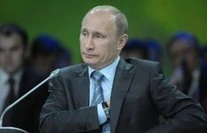The world is going to begin converting its reserves away from debasing dollars and euros, predicts the Russian President.
Russian President Vladimir Putin recently blamed the United States and other G7 countries for causing rampant inflation in global commodities markets. Under these circumstances, he predicts the world will start to transition its reserves away from sovereign debt into “real resources,” deepening the commodity inflation spiral.
End of a Unipolar World
The President aired his criticisms during a more than hour-long speech at the St. Petersburg International Economic Forum Plenary on Wednesday, June 15th. He began his address by claiming that the “very principles of the global economic system have taken a blow.”
“Fundamental business notions such as business reputation, the inviolability of property, and trust in global currencies have been seriously damaged,” he said.
By this, he refers to two unusual phenomena surrounding Western money in 2022: sanctions against Russia, and record-breaking inflation.
Last March, Russian banks were expelled from SWIFT – the world’s largest financial messaging system used by 11,000 institutions globally. The move effectively isolated Russian financial institutions from developed Western economies. This, alongside bans on Russian oil and gas imports, was intended as punishment for the Eastern superpower’s invasion of Ukraine in February.
Putin stated that such measures have proven a double edged-sword, equally harming those that implemented the sanctions. For example, both Europe and the United States are suffering from significantly higher costs of living in recent months – especially fuel costs.
However, inflation in the product and commodities markets is about more than just sanctions and was a “fact of life” well before this year.
“The world has been driven into this by years of irresponsible macroeconomic policies pursued by G7 countries, including uncontrolled emission and accumulation of unsecured debt,” claimed the President.
Money Printing Problems
To address their accruing debt, Western economies have been forced to print more money into the economy at an exponential rate. As Putin notes, the U.S. money supply has grown by 38% in the past two years alone, with Europe’s rising by 20%. This new money quickly found its way across national borders, proceeding “to wipe out global markets.”
Putin backs this theory by highlighting that the United States recently became a net importer of food. It now imports about $350 billion worth of goods every month, up from $250 billion at the end of 2019. That’s a 40% increase – in exact proportion to the country’s money supply growth. “Why exchange goods for dollars and euros that are losing value right before our eyes?” he asked.
Putin said that the combination of record-high inflation and demonstrable risk of confiscation surrounding dollars and euros poses a threat to countries holding these currencies in their reserves.
“A conversion of global reserves will begin … They will be converted from weakening currencies into real resources like food, energy commodities, and other raw materials,” he concluded.
Meaning for Bitcoin?
As Russian sanctions were being implemented in March, many Western politicians scrambled to find solutions to the Kremlin’s potential use of Bitcoin as a means of bypassing their restrictions.
For better or worse, many believe Bitcoin could be the exact solution the Russian government needs. It is censorship-resistant, allows for peer-to-peer exchange, and is immune to the debasement of fiat currency.
Legacy investor and fund manager Bill Miller stated in March that the Russian Ruble’s collapse was bullish for Bitcoin. A week later, an investment strategist from Credit Suisse predicted a very similar flight to commodities as Putin – and that Bitcoin would likely benefit from it.
So far, Putin has recognized the benefits Bitcoin mining could provide to Russia. A member of the State Duma has even suggested that the county may accept Bitcoin as compensation for oil payments.

